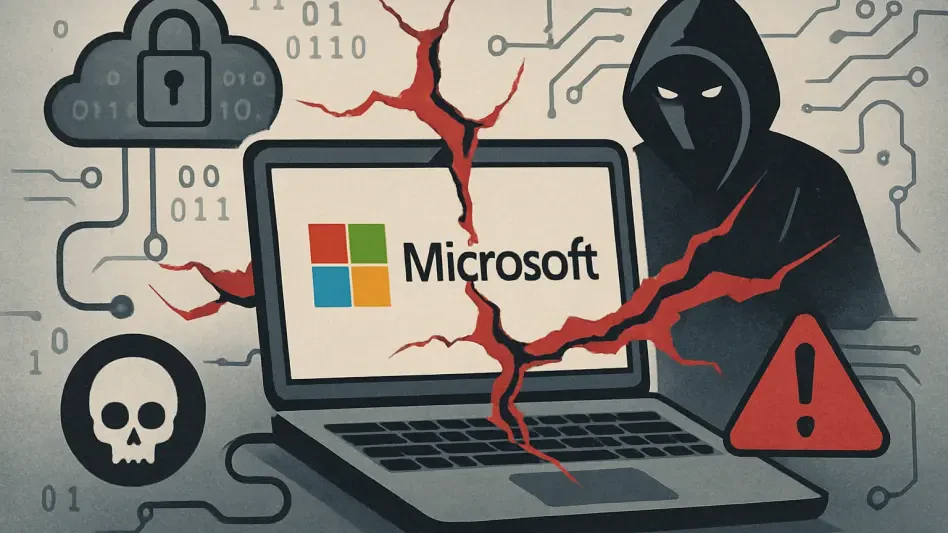In an era where digital infrastructure underpins nearly every facet of modern life, the security of widely used software becomes a linchpin for national stability, and a recent ransomware attack on Ascension Hospital, a major non-profit healthcare system, has thrust Microsoft into the spotlight. Accusations of negligence in securing its products have raised alarms among policymakers and cybersecurity experts. This devastating breach, which compromised the personal data of 5.6 million patients, has sparked a call from US Senator Ron Wyden for a Federal Trade Commission (FTC) investigation into the tech giant’s practices. The incident not only exposed vulnerabilities in Microsoft’s software but also highlighted the broader implications of such lapses on critical sectors like healthcare. As dependency on technology grows, the question looms large: could the security shortcomings of a dominant player like Microsoft pose a genuine threat to national security? This issue demands a closer examination of corporate accountability and the urgent need for robust protective measures.
Unveiling the Ascension Hospital Breach
The Ascension Hospital ransomware attack in 2024 serves as a stark reminder of the fragility of digital systems in critical infrastructure. Originating from a contractor’s laptop infected with malware through a malicious link on Bing, the breach exploited insecure default settings in Microsoft’s software. Cybercriminals employed a technique known as Kerberoasting, taking advantage of outdated RC4 encryption technology from decades past to access Ascension’s Active Directory server. This allowed them to deploy ransomware across thousands of computers and steal sensitive patient data. Despite prior warnings from agencies such as the Cybersecurity and Infrastructure Security Agency (CISA), the FBI, and the NSA about these vulnerabilities, Microsoft’s response has been widely criticized as inadequate. The scale of the attack, affecting millions of individuals, underscores how a single point of failure in widely used software can cascade into a crisis of monumental proportions, raising serious concerns about the preparedness of tech giants to safeguard essential services.
Further scrutiny reveals a troubling delay in Microsoft’s reaction to the known threat of Kerberoasting, which compounded the damage of the Ascension breach. Senator Wyden pointed out that even after being alerted to this specific vulnerability in mid-2024, the company failed to act swiftly, only publishing a technical blog post months later in October and neglecting to deliver a promised software update. Such sluggishness in addressing critical security flaws paints a picture of a corporation struggling to prioritize user safety over operational inertia. This incident is not merely a technical failure but a systemic one, reflecting a broader pattern of delayed responses that could jeopardize not just individual privacy but also the integrity of institutions relying on Microsoft’s ecosystem. The healthcare sector, already burdened with the responsibility of protecting sensitive data, finds itself particularly vulnerable when software providers fall short of maintaining rigorous security standards, amplifying the urgency for accountability.
Historical Patterns of Security Lapses
Microsoft’s track record on cybersecurity reveals a recurring theme of significant lapses that extend beyond the Ascension incident. A notable example is the 2023 hack by Chinese cybercriminals targeting US government agencies, which exposed critical weaknesses in Microsoft’s security framework. A subsequent review board, initiated at Senator Wyden’s request, concluded that the company’s security culture was inadequate and in dire need of a comprehensive overhaul. This critique suggests that the tech giant’s dominant market position may diminish its incentive to address vulnerabilities promptly, as many organizations, including government entities, have little choice but to rely on its products. The dependency on Microsoft’s software, coupled with repeated failures to fortify its defenses, creates a precarious situation where national interests are at risk. These historical shortcomings highlight a troubling inconsistency in prioritizing security, especially when the stakes involve sensitive governmental operations.
Delving deeper into the implications of Microsoft’s market dominance, it becomes evident that the lack of viable alternatives exacerbates the potential for widespread harm. Senator Wyden has likened the company to “an arsonist selling firefighting services,” implying that it profits from the very insecurities it fails to address adequately. This analogy captures the essence of a troubling dynamic where financial incentives may overshadow the imperative to protect users. When critical infrastructure, such as healthcare and government systems, hinges on a single provider’s technology, any lapse in security can have far-reaching consequences. The pattern of negligence, evidenced by multiple high-profile breaches over the years, calls into question whether Microsoft’s role as a cornerstone of digital infrastructure is sustainable without significant reforms. The intersection of corporate responsibility and national security demands a reevaluation of how such influential entities are held accountable for safeguarding the public trust.
Pushing for Accountability and Reform
The growing consensus among policymakers reflects a pressing need for greater accountability among tech giants, particularly when their products underpin essential services. Senator Wyden’s advocacy for an FTC investigation into Microsoft’s practices signals a shift toward stricter oversight of corporate security protocols. His perspective emphasizes the intersection of cybersecurity and corporate responsibility, arguing that the company’s delayed responses and inadequate security culture pose substantial risks to both personal privacy and national interests. The FTC’s acknowledgment of Wyden’s concerns, while not a commitment to immediate action, indicates that the issue has gained traction at a federal level. This development underscores a broader movement to ensure that companies integral to critical infrastructure are not only reactive but proactive in mitigating threats, setting a precedent for how technology providers must align with public safety imperatives.
Reflecting on the path forward, it’s clear that the Ascension Hospital breach and past incidents have spurred a critical dialogue about reforming cybersecurity practices among dominant tech players. The call for accountability gained momentum as policymakers scrutinized Microsoft’s slow response to known vulnerabilities, pushing for systemic changes in how security is prioritized. Looking ahead, actionable steps could include enforcing stricter regulations, mandating timely updates for identified flaws, and fostering competition to reduce over-reliance on a single provider. These measures aim to fortify digital defenses and protect sensitive data from future breaches. As discussions evolved, the focus shifted toward creating a framework where corporate incentives align with national security needs, ensuring that technology serves as a shield rather than a liability for critical systems.








